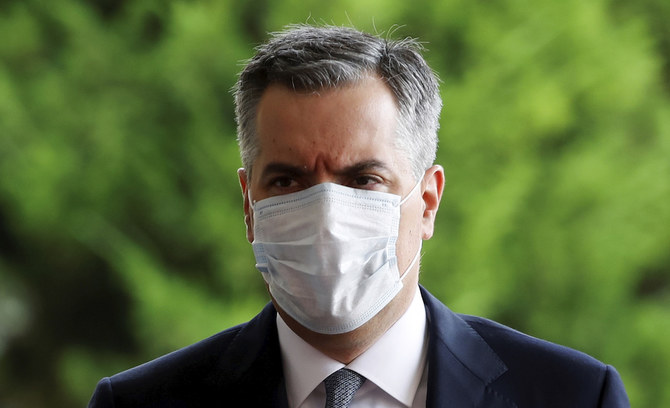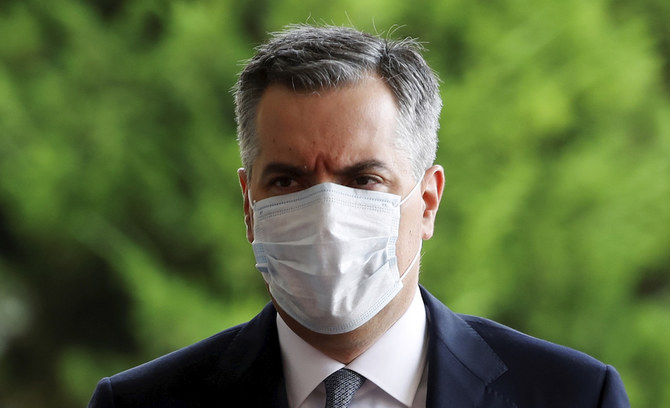BEIRUT: Lebanon’s prime minister designate Mustapha Adib pledged to form a ‘government of experts’ to drive desperately needed reforms in the disaster-hit and economically ailing country.
His announcement came after a high-profile visit by Emmanuel Macron during which the French president said political leaders had agreed on a reform road map involving a government being put together within two weeks, following last month’s devastating blast in the port of Beirut.
“As I leave Beirut, I want to say again and with conviction: I will not abandon you,” Macron said in a statement as he flew out on Wednesday.
The last government resigned in the face of public anger over the August 4 explosion that killed at least 190, wounded thousands and laid waste to entire districts of the capital.
“We hope that we will quickly succeed in forming a government made up of a coherent team that is focused on dealing with the many dossiers before us,” Adib said in a televised statement after concluding initial consultations.
“We will proceed from the principle that the government should be a government of experts.”
Government formation is usually a drawn-out process in multi-confessional Lebanon where a complex political system seeks to share power between different religious groups.
But the country’s deadliest peacetime disaster has created intense pressure for swift reforms to lift it out of its worst economic crisis in decades.
Adib started meeting parliamentary bloc leaders on Wednesday, as Pope Francis warned Lebanon faced “extreme danger that threatens the very existence of the country.”
“Lebanon cannot be abandoned to its solitude,” the pope said.
Lebanese lawmakers rushed to approve the nomination of the little-known 48-year-old diplomat on Monday just hours before the French president landed.
Under Lebanon’s power-sharing system, the country’s main religious communities usually agree on a new government lineup before its announcement.
President Michel Aoun on Wednesday said that Macron’s “drive” to help Lebanon “must be matched by an honest Lebanese determination to help ourselves and to form a capable and transparent government as soon as possible.”
The forthcoming government, the president said, should take “immediate steps toward reform.”
Gebran Bassil, the president’s son-in-law and head of the Free Patriotic Movement said that ministerial portfolios in the new cabinet should not be reserved for specific parties as had been the case in the past.
Lebanon’s worst economic crisis since the 1975-1990 civil war has seen poverty rates double to more than half the population, sent prices soaring and trapped people’s savings in the banks.
Visiting to mark the centenary of the former French protectorate, Macron strove to push for political change without being perceived as meddling in the country’s affairs.
But Lebanese newspaper Al-Akhbar complained the French president had behaved like the “supreme leader of the Lebanese republic” on his visit.
Macron promised to host two conferences in Paris in the second half of October — one to help drum up aid and the other to discuss progress on political reforms. He said he would be back in Lebanon in December.
International donors on Aug. 9 pledged more than €250 million (around $300 million) in emergency aid, during a video conference jointly organized by France and the United Nations.
Analyst Karim Bitar said that, considering the unusual speed with which the prime minister was nominated, Lebanon could have a new government within the next few weeks.
“Everyone in Lebanon now realizes that we no longer have the luxury of time, that the clock is ticking,” he said.
“I do think that the French pressure will lead to some forms of change in the short term because Lebanon is in such a difficult financial” situation, but such changes risked being only “cosmetic reforms,” he said.
“I very much doubt that they... would accept the structural reforms, the systemic reforms that Lebanon desperately needs because that would mean their own disappearance ultimately,” he added, referring to the political establishment.
A protest movement, which has taken to the streets since last October demanding the ouster of the political elite, has already rejected Adib’s nomination on principle.
They allege he is too close to a political class whose alleged corruption and incompetence they blame for the explosion of a large shipment of ammonium nitrate that had languished at Beirut’s port for years.
US Assistant Secretary of State for Near Eastern Affairs, David Schenker, was due in Lebanon Wednesday, the State Department said.
He would “urge Lebanese leaders to implement reforms that respond to the Lebanese people’s desire for transparency, accountability, and a government free of corruption.”
Lebanon PM designate pledges to form ‘expert govt’ in record time
https://arab.news/nzxk7
Lebanon PM designate pledges to form ‘expert govt’ in record time

- Adib started meeting parliamentary bloc leaders
- Macron said political leaders had agreed on a reform road map
Paris conference to support Lebanese army postponed amid regional escalation

- Hezbollah holds protests to mourn Khamenei, but avoids calls for retaliation
BEIRUT: A planned international conference in Paris to support the Lebanese Armed Forces has been postponed amid escalating regional tensions following the latest US-Israeli-Iranian confrontation, Lebanese officials confirmed on Sunday.
Arab News has learned that French President Emmanuel Macron is expected to formally notify Lebanese President Joseph Aoun that the conference, originally scheduled for Thursday, cannot proceed because of the rapidly deteriorating security situation in the region, shifting international priorities, and disruptions to air travel affecting participants’ attendance.
France had planned to host the March 5 fundraising conference to mobilize international financial and logistical support for the Lebanese army, which continues to grapple with severe funding shortages during Lebanon’s prolonged economic crisis.
The army has been tasked since August with consolidating weapons under exclusive state control, a mission that has grown complex as operations expand north of the Litani River, a vast and densely populated area requiring significant manpower and equipment.
Lebanon committed to advancing disarmament efforts under the Nov. 2024 ceasefire agreement with Israel, with the army announcing the completion of the first phase in January.
Army commander Gen. Rodolphe Haykal last month briefed the Cabinet that the next phase aims to confiscate illegal weapons, including those belonging to Hezbollah and Palestinian factions, between the Litani and Awali rivers over a period of four to eight months.
Hezbollah mobilizes supporters
Against this backdrop, Hezbollah called for rallies on Sunday to mourn Iran’s Supreme Leader Ali Khamenei, who was killed in Israeli strikes on Iran a day earlier.
Thousands of Hezbollah supporters dressed in black gathered in Beirut’s southern suburbs and in villages across southern Lebanon, waving Iranian and Hezbollah flags. The demonstrations dispersed in less than an hour and were marked by an absence of speeches or overt calls for escalation.
In a statement mourning Khamenei, Hezbollah Secretary-General Sheikh Naim Qassem condemned what he described as “American and Israeli tyrants,” but avoided any direct call for retaliation against Israel.
Security measures were heightened in the capital ahead of the gatherings, with the Lebanese army reinforcing deployments around Beirut’s southern suburbs and along roads leading to predominantly Christian areas to prevent any unrest.
The Supreme Defense Council convened under President Joseph Aoun hours after Iran confirmed Khamenei’s death and following Iranian missile strikes targeting Gulf states hosting US bases.
Aoun expressed “fraternal solidarity” with Arab states and condemned attacks on civilians and infrastructure. He reaffirmed Lebanon’s official position that the decision of war and peace rests solely with the Lebanese state and its constitutional institutions — a stance reflected in both his presidential oath and the government’s ministerial statement.
Prime Minister Nawaf Salam stressed the need to safeguard Lebanon’s internal stability, urging that the interests of the Lebanese people take precedence and calling for strict control of the security situation in the south and east.
In a precautionary measure, the Lebanese army also announced the suspension of all drone photography permits nationwide effective March 1 until further notice.
Despite mounting regional tensions, Lebanese officials have repeatedly emphasized their determination to prevent the country from being drawn into a broader confrontation.














